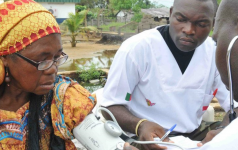Dalberg uses cookies and related technologies to improve the way the site functions. A cookie is a text file that is stored on your device. We use these text files for functionality such as to analyze our traffic or to personalize content. You can easily control how we use cookies on your device by adjusting the settings below, and you may also change those settings at any time by visiting our privacy policy page.
Two major US-based research institutions, partners that have been well-respected for decades for their work in global health, wanted to engage more deeply in translating their evidence to policy action in low- and middle-income countries (LMICs). Their specialty is developing cutting-edge evidence on the impact and cost-effectiveness of global health interventions. This evidence flourished in academic circles, but the institutions believed their work was also well-suited to help policymakers in LMICs prioritize and cost out their health budgets more effectively. Dalberg worked with the institutions to help them understand what it would take to use evidence to meaningfully influence health priorities in two target countries in East Africa.
OUR APPROACH
First, we spoke with ‘connecters’ from Dalberg’s network in each country – individuals that could give us a broad perspective on the advocacy landscape and introductions to hard-to-reach individuals. Connectors rapidly put us close to the action. We spent time with top officials from Ministries of Health, advocacy organizations, bilateral funders, and government agencies to understand what evidence policymakers draw from when making decisions and how evidence has been successfully (and unsuccessfully) used in the past. Throughout the interview process, a member of one of the institutions traveled with us, participating fully in the process so that she could then lead research in future target countries. This landscaping enabled us to trace the path to success – and key barriers along the way – for organizations that had previously used evidence to influence policy issues.
In our advocacy interviews, we asked people to describe health policy changes they were familiar with in great detail. What type of evidence was used? What window of political opportunity might have contributed to success or failure? Who did the organization engage within the Ministry of Health, and how did they present their case – a policy brief, a citizen-driven petition?
These interviews formed the basis of power maps illuminating which relationships are most important for our clients to have their voices heard. Building the right relationships is critical – you want to have a place at the table, or be on someone’s speed dial. Our final presentation included tactical recommendations on which relationships to form, and how.
At the end of the engagement, the organizations had a set of detailed, insider information on the political economy and key individuals in each country, real cases and the implications for their advocacy strategy, a set of recommended activities over the next three years, and a monitoring and evaluation framework to measure their success along the way.
RESULTS
Based on its newly acquired understanding of advocacy and influence in the target countries, one organization has hosted a series of policy forums with officials to open a dialogue on how they can make their research-based recommendations practical for policymakers. The other organization has formally partnered with a local university and the Ministry of Health to increase capacity for creating and interpreting evidence for health policy in-country.



